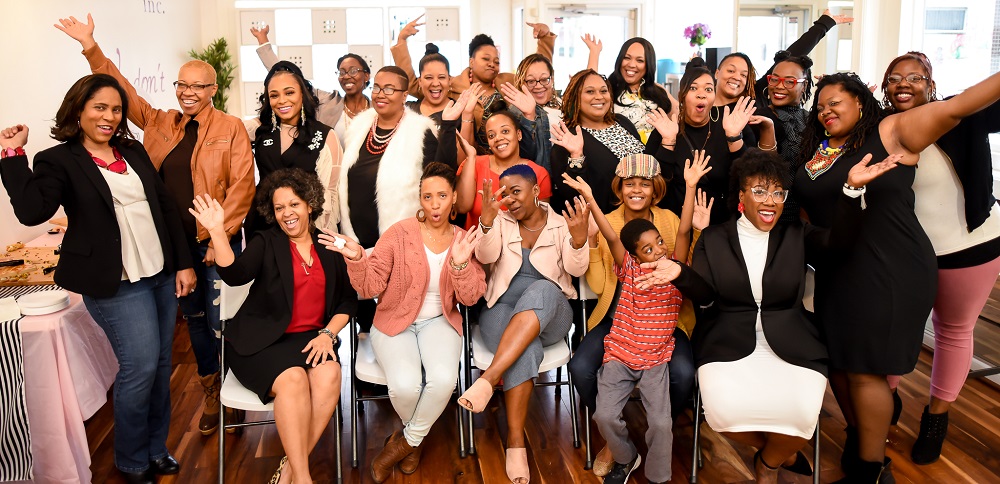
Brown Mamas develops Grow Mama Grow, a database of community courses taught by moms
Photo: Brown Mamas with Muffy Mendoza in center. Photo by Leah Johns.
Muffy Mendoza started Brown Mamas 9 years ago to find and give the support she needed as a young mother suffering from postpartum depression.
Now she wants so much more for Black women across America. Her organization of more than 5,000 women in Pittsburgh is poised to deliver results through new levels of interaction and a growing national presence.
“I see a lot of support groups in other states for Black moms, but rarely do I see this level of connection, where they help each other without prompting, creating a base for positivity,” says Mendoza, of Sheraden, mom to three boys ages 19, 12 and 11.
“The world expects so much from Black women, in general, regardless of whether we’re mothers or not,” she says. “Black moms have never had the opportunity to enjoy motherhood. It’s time for them to enjoy life, whether that’s taking your kids on vacation or enjoying a massage so you can engage in self-care and be a better mother.”
Mendoza’s husband, Mack, helped her to start Brown Mamas, providing essential feedback and encouraging her to follow through with the idea after she invited a few friends to their house to brainstorm. He provided funding for the first five years, but now, philanthropic foundations are offering financial support and other moms are helping her to maintain the Facebook page with more than 9,700 followers.

Mendoza still weighs in on the website content, produces podcasts, gives speeches and helps to plan events such as Brown Mama Monologues, set for May 4, when eight women will share their stories of trials and triumphs.
But she’s mainly busy strategizing to open Brown Mamas chapters in other cities and developing a new aspect to the Pittsburgh organization: the Grow Mama Grow hub. This database of affordable, online courses will help Black moms by teaching them to utilize technology and enabling them to share their expertise.
For the next six months, Brown Mamas will pay moms to add free community courses to the database, and they can earn a little income through a share of the fees. Their expertise might range from a mom with potty training expertise to someone who has successfully navigated the teenage years to a certified doula or wellness coach.

“It’s more difficult to be a Black mama or Brown mama because you’re not supposed to be a good mom when you’re a Black mom,” says Mendoza. “Society tells people we’re welfare queens. This is ultimately a growth opportunity. We’ve been so busy helping other people that we’ve not had the opportunity to help ourselves. … I think Brown Mamas inspires mothers, teaching them life lessons.”
Along with the online courses, there will be a mentoring program to help women reach their goals — whatever they may be. Ten women will participate in a pilot mentoring program that starts in July. Brown Mamas hopes to work with moms from the Hill District, North Side and West End initially, working women or those who are in school but have a goal and have met some obstacles, says Mendoza.
“Every week now, we do check-ins, asking moms, ‘What’s your goal for the week? Post it here,’ and they come back at the end of the week and say whether they met their goal,” she says. “Our community is extremely goal-oriented and they’re going to work their butts off to meet it.”
The Grow Mama Grow hub is a way for women to tap into and contribute to positive parenting resources, says Mendoza. Black mothers typically “aren’t getting connected with the resources available, or a lot of Black moms have had negative encounters with organizations in Pittsburgh,” she says. “We want to focus on helping a mom to make those resource connections and, once she connects, she can use those resources to help reach other goals.”
Not only can moms earn a commission from the courses they add to the database but they’ll learn that “there are other ways you can make money than just a 9-to-5 job,” she says. “It doesn’t have to be a long, drawn-out process. Technology is changing the way we can make money and creating an online course is really easy to do. This is a skill set they can use for anything they want to do in their lives.”

Mendoza is living proof that a person can accomplish something wildly different from her early expectations in life. As a child growing up in Wilkinsburg, Mendoza dreamed of becoming a marine biologist. Instead, she went to school to learn journalism, met her husband and lived in his hometown of Brooklyn for a while after they married. They returned to Pittsburgh after their third son was born and she was experiencing the “baby blues.”
She remembered the difficulties her own mother had as a single mom.
“I wanted to create an organization that would allow me to not have the same experience that my mom had’” Mendoza says. I didn’t have a plan, really; I was just led by my heart — and that’s really the case today,” she says.
Back in Pittsburgh, she found a part-time job for a while with American Urban Radio Networks and began blogging when Brown Mamas was in its infancy. She didn’t make money from any of the project’s initial events, but the organization grew through her blog posts and the hashtag #GoodMama when she wrote an article about her own motherhood journey, saying, “I’m what a #GoodMama looks like.”
“Being Black is not a marker for being a bad mother,” Mendoza says. “Black people were interested, but other people were like, ‘What is this about?’ It was interesting. … We’ve been claiming to go national for the last few years. I get emails from people who want to start a Brown Mamas chapter in their community. I want them to take on the mantle of doing the hard work with Black moms … where moms say, ‘I’m struggling and I need some help.’ ”
Mendoza is pleased with the organization’s strength and growth. She has authored a book, “The Brown Mama Mindset,” which was featured at the 2018 Essence Festival, and two companion guides, “The Mama Map Workbook” and the “Write Here Mindfulness & Meditation Journal.”
The Brown Mamas website alone offers women a Big List of Resources for Pittsburgh Moms, including discount infant items, organizations geared to parents and children, free stores, food assistance, housing and financial assistance, educational resources and childcare resources.
“I’m hoping that [women are] taking the resource information and connections and applying it to their real lives,” Mendoza says. “It took a while to get here, but I’m ecstatic. … There have been so many people who have been so instrumental in bringing this forth. I didn’t do this alone, by any stretch of the imagination. We have a whole community of women who, at some point or another, pushed me forward and helped me to keep the faith.”
